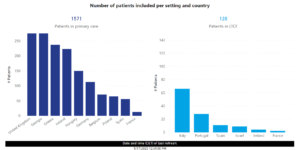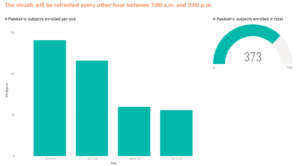Recently, two real-time graphs were added to the VALUE-Dx website, as an easy tool to track the inclusion progress of the PRUDENCE and ADEQUATE trails. This information is crucial because at the start of these trials, a target number of patients was set that has to be included for the trials to have statistical “power”. If these targets aren’t met, there is a risk that the studies will be considered unsuccessful because the research questions couldn’t be answered with enough certainty.
The graphs are updated on a daily basis and show how many patients are recruited per site or per country. Thanks to this data, it becomes clear which sites or countries are recruiting well and which are lagging behind the inclusion schedule. These sites or countries are then approached to see how they can be supported in order to reach the target.
PRUDENCE (Primary Care)
The PRUDENCE graph indicates the number of patients per setting and country. It is split up into patients in primary care and in long-term facility care. Within this trial, a country can have several sites, for example multiple GP offices in Primary Care.
ADEQUATE (Emergency Rooms)
The ADEQUATE graph is also split up into two parts, the left part shows the number of paediatric patients enrolled per site and the right one the total number.
The inclusion graphs have been created by the VALUE-Dx Data Management & Analytics team at the UMC Utrecht. The inclusion graphs are just one example of the team’s output. Other graphs are crucial tools to monitor data quality and the data cleaning process.
About the trials
The PRUDENCE trial researches whether having a community-acquired acute respiratory tract infections diagnostic (CA-ARTI-Dx) test result available when a clinician is considering, or plans to prescribe an antimicrobial, leads to more appropriate prescribing decisions, without causing harm to patients.
The ADEQUATE trial is a randomised controlled trial of rapid syndromic diagnostic testing for enhancing the quality of antibiotic prescribing for community acquired acute respiratory tract infection (CA-ARTI) in emergency rooms in Europe.




